Filter by

Inside Installations
Anything is possible in installation art. The typically short lifespan of the materials and techniques used and the intended experience can be endless, often to the despair of the custodian of the work. The processes involved in preserving this complex form of art, reinstalling it, finding ways to recreate the experience over and again, as well as the decisionmaking that underlies these process…
- Edition
- -
- ISBN/ISSN
- 9789048513659
- Collation
- -
- Series Title
- -
- Call Number
- 709.04 WHA i
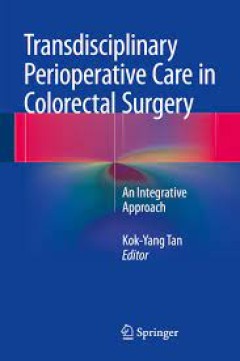
Transdisciplinary Perioperative Care in Colorectal Surgery An Integrative Ap…
The field of colorectal surgery has undergone tremendous developments in recent decades. Surgery has become less invasive, new perspectives and insights have improved perioperative management and novel outcome measures have been defined. At the same time, the limits of surgical technique and perioperative care are being challenged by more complex patients. In order to realize the immense potent…
- Edition
- -
- ISBN/ISSN
- 978-3-662-44020-9
- Collation
- -
- Series Title
- -
- Call Number
- -
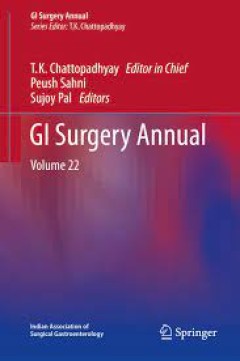
GI Surgery Annual Volume 22
The twenty-second volume of GI Surgery Annual covers a gamut of topics from oesophageal adenocarcinoma, to motility disorders of the colon and rectum, mesenteric tumours as well as the contemporary technique of ALPPS, acute portal vein thrombosis and small for size syndrome in live donor liver transplant. The chapter on advances in gastrointestinal surgery as every year reviews the important…
- Edition
- -
- ISBN/ISSN
- 978-981-10-2010-0
- Collation
- -
- Series Title
- -
- Call Number
- -

Modern Management of Cancer of the Rectum
Modern Management of Cancer of the Rectum is intended to provide a comprehensive overview of all aspects of rectal neoplasms. It addresses epidemiology, biology, screening and chemoprevention, the role of imaging in diagnosis, staging and prognosis, radiation therapy, medical and surgical treatment, as well as new modalities of therapy, including laparoscopy, and transanal endoscopic surgery. A…
- Edition
- 2
- ISBN/ISSN
- 978-1-4471-6608-5
- Collation
- XVII, 472
- Series Title
- -
- Call Number
- -
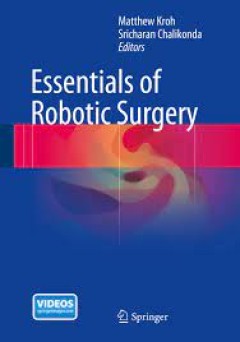
Essentials of Robotic Surgery
Essentials of Robotic Surgery is designed to present a comprehensive and state-of-the-art approach to robotic surgery within the broad confines of general surgery. Sections address preliminary issues faced by surgeons who may be initially undertaking robotics. These areas include training, basic techniques and setup, as well as general troubleshooting. Subsequent chapters focus on specific dis…
- Edition
- -
- ISBN/ISSN
- 978-3-319-09564-6
- Collation
- 2 b/w illustrations, 117 illustrations in colour
- Series Title
- -
- Call Number
- -

Endoscopy in Small Bowel Disorders
This volume reviews the history of endoscopy to diagnose small bowel disorders, places other diagnostic modalities into perspective, and defines the role of capsule endoscopy and per overtube assisted and retrograde enteroscopy in disorders as disparate as gluten sensitive enteropathy, small bowel neoplasms, and inflammatory bowel disease. The book further details the nonoperative approach to N…
- Edition
- -
- ISBN/ISSN
- 978-3-319-14415-3
- Collation
- 85 b/w illustrations, 80 illustrations in colour
- Series Title
- -
- Call Number
- -

Endoscopy in Inflammatory Bowel Disease
This book conjoins the latest advances on the use of endoscopy to diagnose, monitor, and treat patients with inflammatory bowel disease. Chapters include the historical use of rigid sigmoidoscopy, non-interventional imaging procedures, and the correlation of pathology and endoscopic visualization. This is the first book to include individual chapters in gastroenterology, colorectal surgery, and…
- Edition
- -
- ISBN/ISSN
- 978-3-319-11077-6
- Collation
- 43 b/w illustrations, 101 illustrations in colour
- Series Title
- -
- Call Number
- -
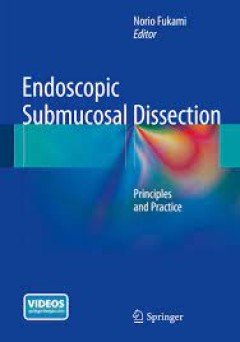
Endoscopic Submucosal Dissection Principles and Practice
This volume educates physicians on the basic knowledge of ESD, from indication of this technique to assessing suitability and technical aspects of each important step. The text is structured to guide readers to understand the principles, including history, why ESD was designed and developed, indications, as well as how to evaluate lesions and perform actual procedures. Abundant photographs and …
- Edition
- -
- ISBN/ISSN
- 978-1-4939-2041-9
- Collation
- 15 b/w illustrations, 150 illustrations in colour
- Series Title
- -
- Call Number
- -
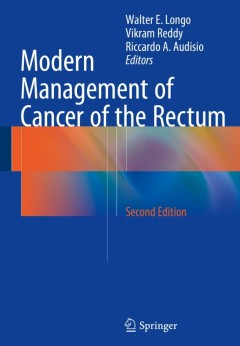
Modern Management of Cancer of the Rectum
Modern Management of Cancer of the Rectum is intended to provide a comprehensive overview of all aspects of rectal neoplasms. It addresses epidemiology, biology, screening and chemoprevention, the role of imaging in diagnosis, staging and prognosis, radiation therapy, medical and surgical treatment, as well as new modalities of therapy, including laparoscopy, and transanal endoscopic surgery. A…
- Edition
- 1
- ISBN/ISSN
- 978-1-4471-6608-5
- Collation
- XVII, 472
- Series Title
- -
- Call Number
- -
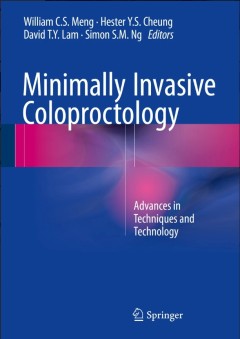
Minimally Invasive Coloproctology
In this book, pioneers and distinguished masters of surgery describe novel minimally invasive colo- and anorectal procedures that have been developed in Asia but are of international applicability. The presented techniques are wide ranging in nature and relate to colon surgery, rectal surgery and the treatment of hemorrhoids, fistulas and chronic constipation. Each procedure is carefully descri…
- Edition
- 1
- ISBN/ISSN
- 978-3-319-19697-8
- Collation
- VIII, 231
- Series Title
- -
- Call Number
- -
 Computer Science, Information & General Works
Computer Science, Information & General Works  Philosophy & Psychology
Philosophy & Psychology  Religion
Religion  Social Sciences
Social Sciences  Language
Language  Pure Science
Pure Science  Applied Sciences
Applied Sciences  Art & Recreation
Art & Recreation  Literature
Literature  History & Geography
History & Geography